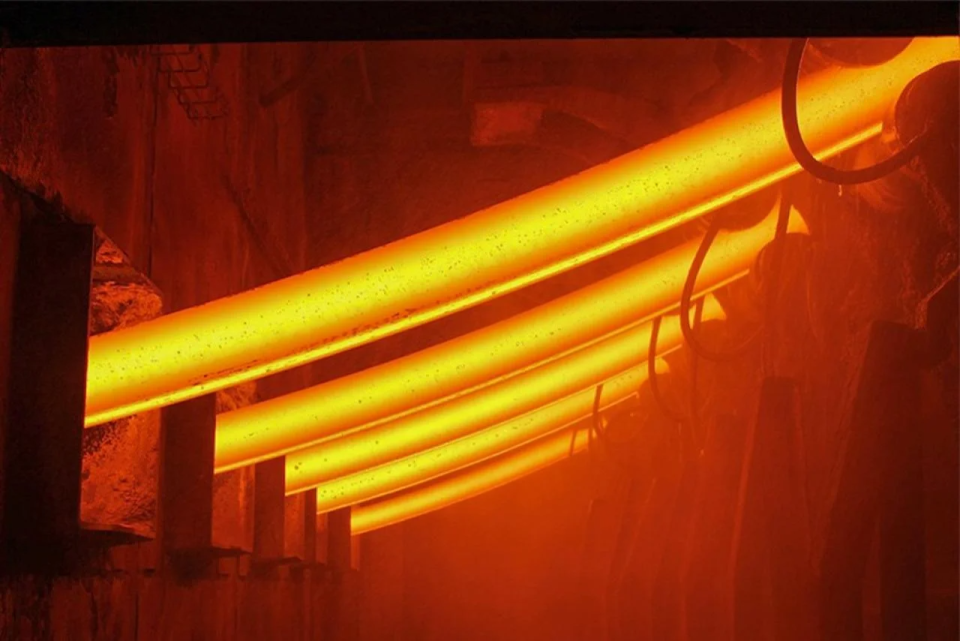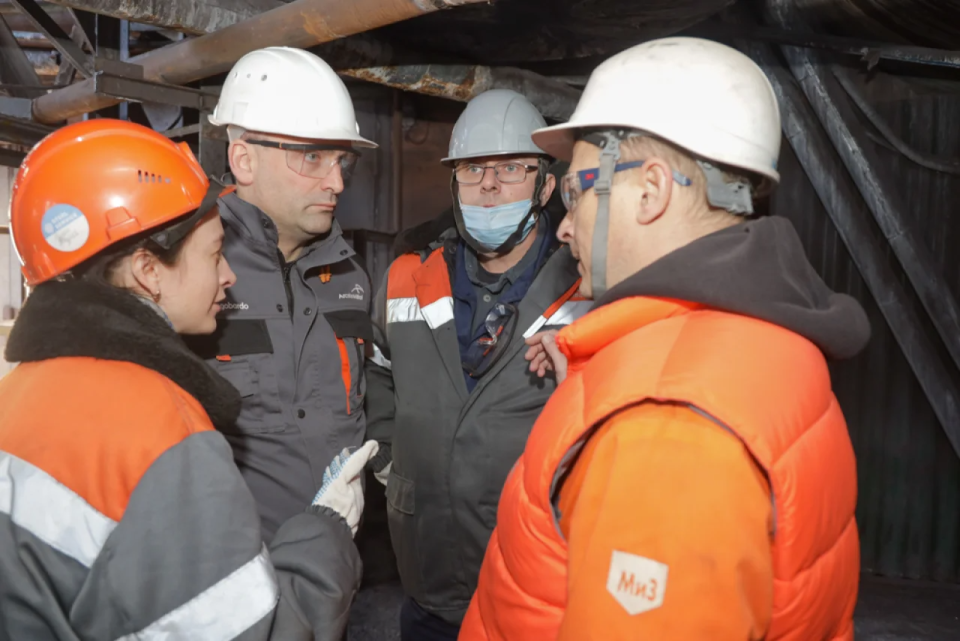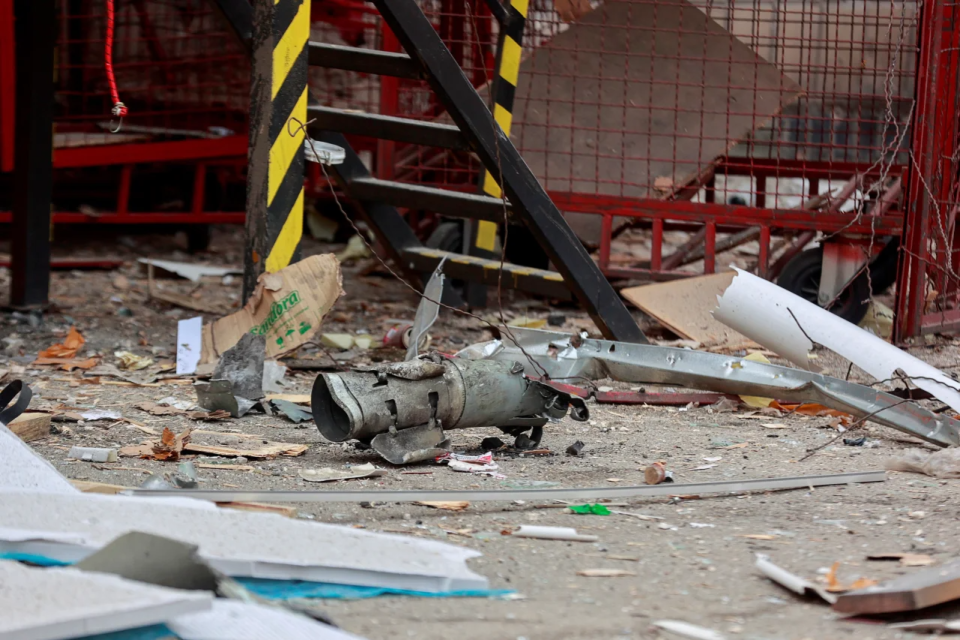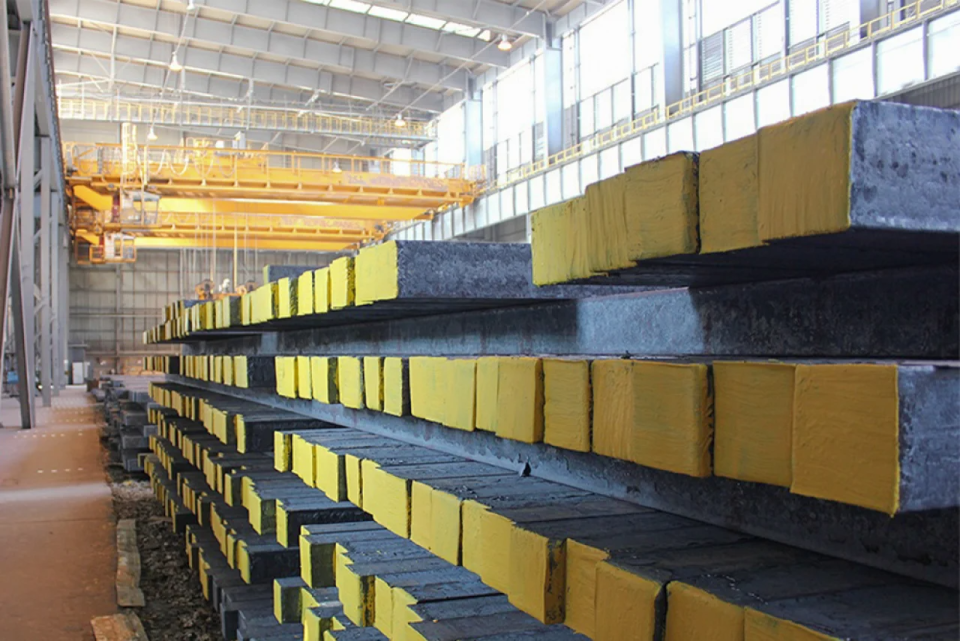ArcelorMittal Kryvyi Rih CEO on blackouts, dumping by Russia and Turkey, and plans ahead
In April 2022, we spoke with Longobardo about the work of ArcelorMittal Kryvyi Rih (AMKR) at the beginning of a full-scale Russian invasion. At that time, the Russian army was close to Kryvyi Rih.
But at the end of autumn, the Armed Forces of Ukraine were able to liberate the right bank of the Dnipro River in Kherson Oblast and oust the Russian invaders from one of the largest industrial centers of Ukraine.
In particular, it was possible to liberate the village of Arkhanhelske in Kherson Oblast, where a subsidiary company, ArcelorMittal Beryslav, is located.
Read also: Russians use banned cluster munitions against Kryvyi Rih
However, the AMKR’s workshops came under direct Russian missile fire, and the plant was completely stopped due to the destruction of the energy infrastructure.

After the blackout, Longobardo and his colleagues lived at the plant for two days, trying to solve the issue of safe shutdown and restart of the main production units.
The top manager told NV Business about the experience of working in critical conditions, planning for the next year, a trip to the liberated part of Kherson Oblast and why his colleagues from head office in Europe consider trips to Ukraine deadly dangerous.
NV: How does the company work now? Because the last thing we heard was a shutdown due to a blackout.
Longobardo: The mining department works at 20-25% of our regular volumes. In steel production, we will soon relaunch blast furnace No. 6 to reach a steel production level of 20-25% of our capacity.
When the first total blackout occurred, my team made great efforts to prevent complications. Finally, we were able to stop all the equipment safely.
NV: What made it possible?
Longobardo: We made certain changes in the operation of internal power supply networks. This allowed to provide sufficient power supply to equipment that is in hot idle without causing a fire or other problems in emergency situations.
I was personally at the factory with all the workers. We spent two nights at the enterprise since the decision had to be made instantly. After that, we started thinking about how to relaunch.

NV: What prevented this?
Longobardo: Our plant at full load consumes 400-450 MW. At 20-25% load, the consumption is about 100-120 MW.
After the blackout, we only got 60 MW guaranteed, and not all day. It could be like this: we start the morning with 70 MW. After two hours, the energy company calls and says that it is necessary to reduce consumption by 20 MW. And they call back in one hour and say that they are returning 5 MW. This is not so easy to do in our industry.
NV: How did these restrictions in energy sector affect production?
Longobardo: We began to consume raw material stocks. At one point, there were only enough iron ore concentrate stocks left for five days. If we can’t get 100MW, we need to run the equipment one at a time. We did so. The blast furnace was stopped for seven days.
Read also: Russian invaders shell settlements near Kryvyi Rih with Grad rockets
Now the market situation is improving. But due to the shortage of electricity, we are forced to choose: either create a stock of agglomerate, or launch the second blast furnace.
NV: Are there other difficulties in the work of the metal plant?
Longobardo: VAT reimbursement was such a problem this year. During 2021, it took place rather quickly. We automatically received funds after one or two months. But there was a long period in 2022, several months, when there was no payment for anyone in the mining and metallurgical industry.
I understand that the problems in the budget have only accumulated since the beginning of the full-scale war. The total amount owed to ArcelorMittal Kryvyi Rih amounted to UAH 4.7 billion ($128.5 million). But reimbursement finally began after a long delay, and the company received an overdue debt of UAH 1.3 billion ($35.5 million) in December.
Now we expect the return of more than UAH 2.5 billion ($68.3 million) in debt, and that the state VAT reimbursement process will become more stable in the future.
For us, this is one of the main cash flows since the production has greatly decreased. In addition, we actually only export as the Ukrainian market is 30-40% of what it was before.
NV: How many people worked at ArcelorMittal Beryslav?
Longobardo: 43. We were in constant contact with all our employees. We lost contact with two of them in the spring but found them when the territory was liberated. All our employees are safe. I also went to Arkhanhelske to personally see what our workers who lost their homes need. People are asking for help in restoring their houses. We plan to cover almost all of the costs involved.

NV: While ArcelorMittal Beryslav was under occupation, where did you get limestone? Ukraine or import?
Longobardo: Ukraine. We are operating at 20% capacity this year, so demand is low. We have about 30,000 tons of limestone from Beryslav in stock, enough for several months. We ask for the support of Ukrzaliznytsia railways to transport these volumes to Kryvyi Rih.
Mittal, India and Russian missiles
NV: You are a foreigner, but you have been familiar with Ukrainian realities for a long time. How does the management of ArcelorMittal head office react to the events in Ukraine? Have you discussed this with Mr. Mittal?

Longobardo: After the start of the war, we communicate almost every day.
When you are outside Ukraine, it is important to learn more about what is happening here. For example, on Dec. 5, three missiles hit a warehouse of ArcelorMittal Kryvyi Rih’s finished products. Unfortunately, one worker died. The sympathy of foreign colleagues outside Ukraine was enormous. I spent a lot of time trying to calm them down as they tried to understand the extent of the damage.
People think there that as soon as you cross the border of Ukraine, you will be killed immediately. But there are more dangerous areas, there are less dangerous. When you are here and you must solve problems, you forget about all that and you are less nervous. You just have tasks to do.
The group has been very supportive and will continue to support us. We keep the staff, we pay everyone a salary.
As an example of the company’s support, I will say that $130 million in capital investment has been secured for ArcelorMittal Kryvyi Rih for 2023.
NV: How many capital investments will there actually be this year?
Longobardo: About $100 million.
NV: But were you planning more?
Longobardo: Yes. We had big projects that are now on hold. For example, the construction of a new coagulation factory and another two-three large projects that cannot be implemented during the war.
Plans for the future and sanctions against the Russians
NV: You have already said something about staff retention. Does the head office have a cut-off point?
Longobardo: I have no recommendations on this. I have presented my budget for 2023 which preserves all jobs. And the budget was approved. I hope we will have some good news regarding ports and price increases in a few weeks.
If the working staff is idle, they are paid two-thirds of their salary. If people work, they are paid 100% of their salary. We’re trying to introduce part-time employment for administrative staff. This means that colleagues take five days of unpaid leave per month.
NV: You mentioned the business plan for 2023. Do you have one or several options?
Longobardo: We had several variants of the business plan during preparation: optimistic, basic and pessimistic. We approved the basic. It includes the production of 2 million tons of metal products and 2.4-2.5 million tons of iron ore concentrate for export.
Of course, good news may appear. We are doing everything to be ready for such a scenario. But even if everything (war) ends tomorrow, it does not mean that we will immediately increase production. So far, I don’t see it. Therefore, conservative expectations are sufficient for Q1 2023. I think it will be similar to Q4 2022.
NV: What volumes of ore and rolled metal production do you expect this year?
Longobardo: In 11 months of 2022, we produced 1.2 million tons of steel, 1.1 million tons of rolled steel, and 1.6 million tons of cast iron. Concentrate production is at the level of 4.3 million tons, ore production amounts to 11.3 million tons. This year has been very strange. We expect more stable work next year.
NV: Do you plan the budget for a year or for shorter periods?
Longobardo: For a year and we review it quarterly. It’s okay to revise. And it relates to the war. And every month we provide the corporate office with a revised sales plan.
NV: If you imagine that the war ends, how long will it take you to fully resume work?
Longobardo: We are carrying out a lot of preparatory work for a quick restart. Therefore, I think that the increase in the supply of coal will be the main limitation, which may take two-three months.
Related enterprises and working with partners
NV: There was a mini-scandal in the summer with the resumption of supplies of flat rolled products from ArcelorMittal Temirtau (Kazakhstan) to Russia. What is the current situation and what are the group’s plans for work in this market?
Longobardo: I was not involved in this situation. But, as far as I understand, the ArcelorMittal enterprise in Kazakhstan has lost almost all export markets. They sold half of their products to Russia, and the rest were exported through the territory of Russia. Other export options included transit through the Caspian Sea and Azerbaijan or through Shanghai. These are very expensive routes.
The problem reached the political level. The government of Kazakhstan asked: “Why don’t you sell, since there are no sanctions on your products?” And this is the largest enterprise in the country, so the issue of nationalization could arise.
In order not to close the company completely, it was necessary to resume shipments to the Russian market. But these are minimal volumes. In turn, the Russians want to close their market from the Kazakh products of ArcelorMittal. After all, they now have a surplus of rolled metal. Russian enterprises are underloaded and do not need competitors.
NV: So, the Russians are now trying to limit the import of rolled metal?
Longobardo: Yes. They can no longer sell globally like they used to. They can only sell in some countries where they face dumping. But when you drop the price, you come under an anti-dumping investigation.
And here a more serious problem arises. These are Turkish traders who buy large volumes of Russian metal and resell it in other countries already at market prices.
Therefore, it is necessary to increase the effectiveness of sanctions so that there is no boomerang: if you introduce sanctions, you yourself suffer. The EU imposed sanctions but cannot sell its products to Turkey because there is a Russian product there, which is 20% cheaper. Moreover, the Turks resell it all over the world. And they earn a lot of money.
NV: In the spring, we talked with you about support from the corporation. In particular, about the supply of coal from Poland, so as not to drive empty wagons. Is such a scheme of cooperation preserved?
Longobardo: Now we have much less loading, so we buy coal in Ukraine. We purchase 20% of the previous volumes, 70,000-80,000 tons per month. Although earlier it was 300,000-350,000 tons.
In the summer, consumption decreased at all metallurgists, so DTEK and Metinvest energy companies were able to meet all coal needs.
NV: Do you continue cooperation with Metinvest on coke?
Longobardo: During the first phase of the war, when they lost several batteries (in Mariupol and Avdiyivka), they needed small amounts of coke, which they took from us. But recently, their enterprises have also reduced the output of iron and steel, so Metinvest has enough of its own coke production.
Read the original article on The New Voice of Ukraine

